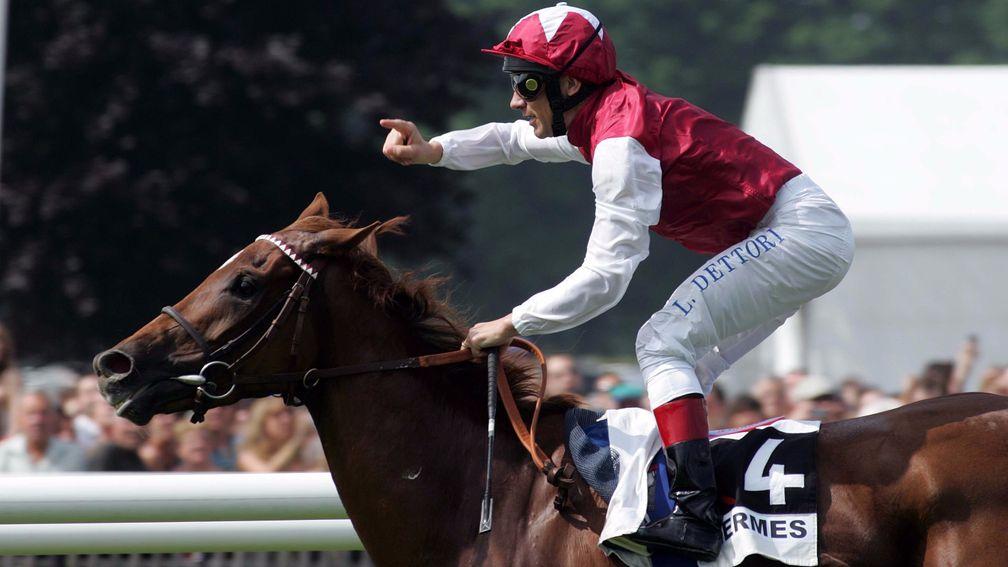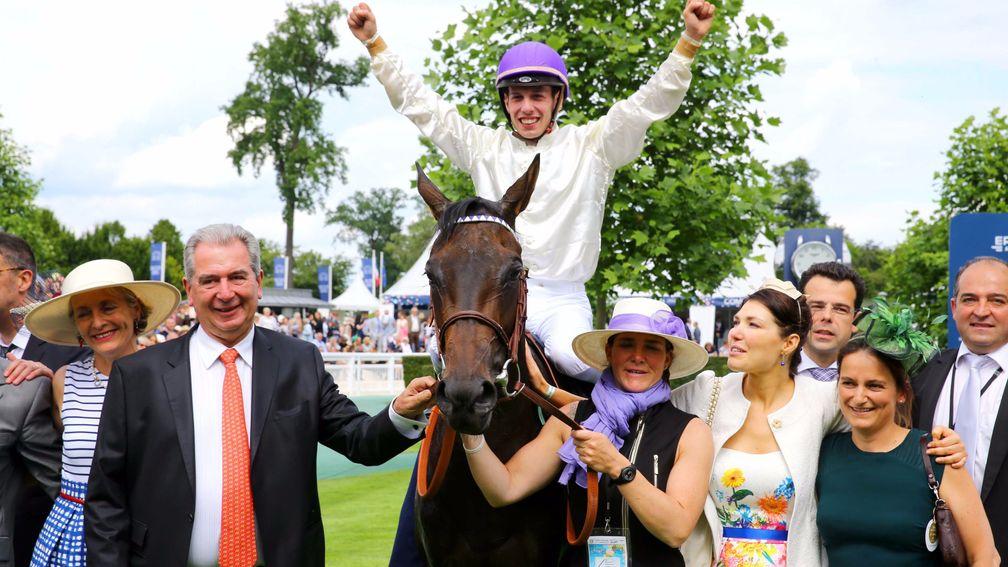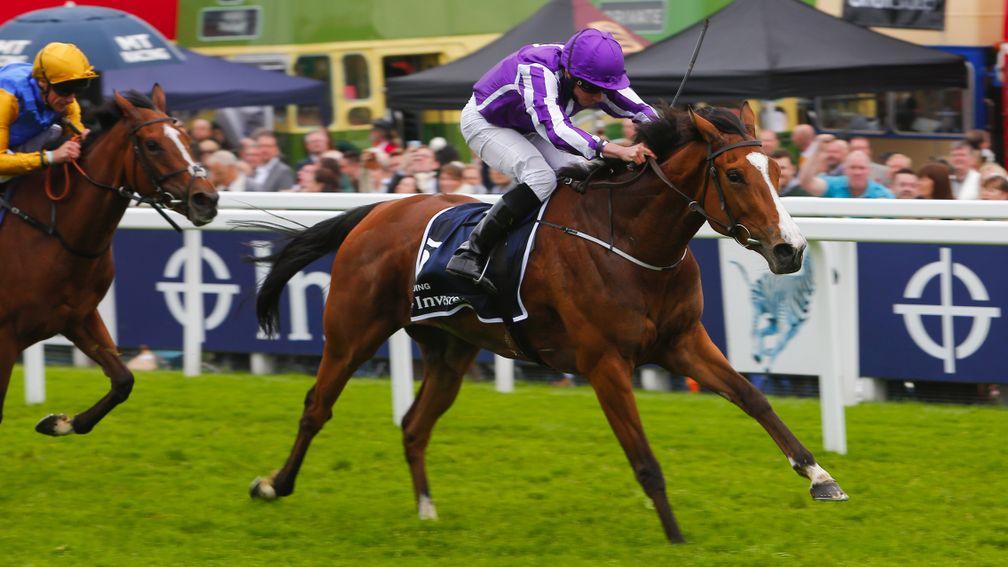Can Sistercharlie use her speed to challenge the Diane trends?
Trial winners have a poor record at Chantilly but we might be due a change

Visiting Japanese schoolchildren have just about shaken the last cherry blossom petals from the trees at the Chateau de Sceaux (home of Louis XVI's first minister, not the birthplace of Willie Mullins' star chaser), which in seasonal terms means we can justifiably take a first look at Chantilly's June middle-distance Classics.
In particular, news of the retirement of La Cressonniere prompts thoughts of the Prix de Diane Longines, which this year returns to its prime slot on the Sunday before Royal Ascot week.

Sistercharlie won the Prix Penelope at Saint-Cloud on Sunday, a trial which – in common with the Prix Cleopatre – is saddled with the unenviable record of having produced precisely zero winners of the Diane since the outstanding Pawneese in 1976.
In recent years a whole raft of established trials for the Diane have endured something of a lean spell, while those fillies who have stepped up from a mile in the Poule d'Essai des Pouliches have doubled up in three of the last six editions.
Before examining the historical record of the trials, it is only fair to highlight the two most recent performances of Sistercharlie, whose trainer Alex Pantall landed the Diane in tandem with Frankie Dettori back in 2007, courtesy of West Wind.
Sistercharlie has raced three times at Saint-Cloud in less than six weeks and, having needed the run first up in the Prix Rose de Mai, has twice produced a real burst of acceleration to seal victory.
Perhaps her success in the Prix Durban was even more revealing than Sunday's win in the Penelope, since she was trapped with nowhere to go until around a furlong and a half out.
Pantall pointed out on Sunday that the form of those three runs brings in many of the same horses and questioned whether there is a whole lot between them but, on good ground, Sistercharlie's turn of foot makes her the clear pick of that particular bunch.
The other trial to have been run so far was the Group 3 Prix Vanteaux at Chantilly on April 9, a race from which both Zainta (1998) and Latice (2004) went on to score in the Diane over the last 20 years.
Goldikova's little sister Gold Luck got the better of a three-way fight with Monroe Bay and Hebah and could now head to Deauville for the Prix Saint-Alary on May 14.
Road to the Prix de Diane Longines 2017
Prix Vanteux (Group 3, Chantilly, 1m1f) 2 wins
Prix Penelope (Group 3, Saint-Cloud, 1m2½f) 0 wins
Prix de la Seine (Listed, Chantilly, 1m3f) 1 win
Poule d’Essai des Pouliches (Group 1, Deauville, 1m) 6 wins
The Gurkha Coolmore Prix Saint-Alary (Group 1, Deauville, 1m2f) 4 wins
Prix Cleopatre (Group 3, Saint-Cloud, 1m2½f) 0 wins
Prix Finlande (Listed, Chantilly, 1m1f) 1 win
PRIX DE DIANE LONGINES (Group 1, Chantilly, 1m2½f)
Figures in italics are the number of Diane winners produced by each trial in the last 20 years
The eagle-eyed will have spotted that the above list of races accounts for less than 18 editions of the Diane, even allowing for the "foreign interventions" of Confidential Lady and Star Of Seville.
One accounting anomaly is 2002 Diane heroine Bright Sky, who finished second in the Finlande, the Vanteaux and the Saint-Alary.
Perhaps more pertinently, five of those 20 winners came via minor conditions races, including recent stars Valyra (2012) and Treve (2013).
France Galop have suppressed a number of such conditions races while combining others this season, in an effort to boost field sizes and funnel the better horses towards contesting Listed and Group races.
The example of the Prix Vanteaux illustrates the issue for trainers: Gold Luck and Hebah had run second and third to none other than Al Wukair in the Listed Prix Isonomy at two; but runner-up Monroe Bay was stepping straight out of maiden company.
Put simply, more of the horses with Classic potential could wind up running in the recognised trials than has hitherto been the case.
Naturally the Poule d'Essai des Pouliches will remain the number one "trial" for the Diane for at least two very good reasons.
First, the the gap between the two races allows a good preparation while the Diane only seeks to stretch a Classic miler's stamina by another two and a half furlongs.

Second, the available pool of Group 1 candidates is unlikely to be so great in any given year that a sizeable part of that group avoids the Poule d'Essai. It is simply where many of the best fillies are aimed.
Trainers will have been all too aware of the dire record of both the Penelope and the Cleopatre, which some consider to be further compromised in being run the other way round to the Diane at right-handed Saint-Cloud.
But last year's Penelope heroine Camprock was beaten a nose in the Saint-Alary before suffering injury on the big day itself, while Sistercharlie looks an interesting project for Pantall, who quietly amasses success year after year from his Beaupreau base in the Loire Valley.
Meanwhile in the Presidential horse race...

Results from the first round of voting in France's presidential election have provoked an outbreak of journalistic standards such as "unprecedented" and "historic" among both broadcast and print brethren.
From a bewildering field of 11 pretenders, four front-runners gradually pulled clear of the field – themselves separated by just a few percentage points in the final polls – with (and I'm guessing you might already know this if you've read this far) Emmanuel Macron now facing Marine Le Pen of the Front National in the run-off on May 7.
Many of those covering Sunday night's results reached for the historical comparison of 2002, when Le Pen's father, Jean-Marie, elbowed his way into the second round at the expense of the Socialist Party candidate, Lionel Jospin.
Contrary to most of the coverage outside France, one way of reading the first-round results from the weekend is to suggest that elections here have actually become rather more predictable in the intervening 15 years.
On Sunday, the leading four candidates accounted for nearly 85 per cent of the vote, whereas in 2002 that figure was less than 60 per cent. The sitting president and first-round leader, Jacques Chirac, attracted only one in five of the French electorate.
If you want an illustration of just how downright strange 2002 was, I give you ninth-placed Jean Saint-Josse - then an MEP and to this day mayor of the small south-western town of Coarraze - who garnered 1,204,689 votes nationally (4.23 per cent) as head of the Hunting, Fishing, Nature and Traditions party.
Sixteen went to post that year, although history doesn't recall whether bookmakers abroad paid out on fourth-placed Francois Bayrou, a notable owner/breeder whose Alix Road was third in the Saint-Alary.
Published on 25 April 2017inInternational
Last updated 13:17, 25 April 2017
- OBS Spring Sale picks up steam as $1.9 million Tiz The Law filly leads the action
- Falbrav owner Luciano Salice dies at the age of 88
- Meet the Kazakh wonderhorse rising from obscurity and causing a sensation in his bid for Dubai World Cup glory
- Charlie Appleby 'still in a rebuilding process' after underwhelming 2023 - but is hopeful new generation can help him bounce back
- Dubai World Cup rides set to be pivotal in new partnership between Kieran Shoemark and Gosden stable
- OBS Spring Sale picks up steam as $1.9 million Tiz The Law filly leads the action
- Falbrav owner Luciano Salice dies at the age of 88
- Meet the Kazakh wonderhorse rising from obscurity and causing a sensation in his bid for Dubai World Cup glory
- Charlie Appleby 'still in a rebuilding process' after underwhelming 2023 - but is hopeful new generation can help him bounce back
- Dubai World Cup rides set to be pivotal in new partnership between Kieran Shoemark and Gosden stable